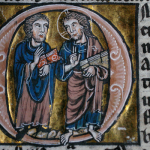Last updated on: April 10, 2015 at 6:04 am
By
CNA Daily News
Rome, Italy, Apr 10, 2015 / 12:04 am (CNA).- As the Church prepares to conclude its celebration of the 50th anniversary of Vatican II later this year, one book is taking a hard look at the council's vision of ecumenism in a world where attitudes toward social justice are constantly in flux. Is it true, as some say, that doctrine divides, while justice unites? Can social justice really build Christian unity? Is it capable of declaring Christ to the world?Justice, Unity, and the Hidden Christ: The Theopolitical Complex of the Social Justice Approach to Ecumenism in Vatican II takes a look at the council's decree on ecumenism, Unitatis Redintegratio, examining these questions in light of the broader social and cultural picture. Matthew John Paul Tan, who lectures in theology and philosophy at Campion College in Sydney, as well as the John Paul II Institute for Marriage and Family in Melbourne, Australia, is the author of the book. He sat down with CNA to speak about what he describes as the “theopolitical complex” – the social, cultural, and political realities and presumptions within which social justice operates, and its dynamic in relation to authentic Christian unity. “If you want to make the act of social justice build Christian unity, you then have to pay attention to this complex,” Tan said. Otherwise, he warned, there is the danger of allowing political agendas and ideologies “to distort what actually counts as a Christian act.” “What counts as justice in the theopolitical context of the culture that we live in now,” he said, “is actually one that is at odds with justice as is defined by Christian tradition.” Tan's book centers largely on Unitatis Redintegratio, part 12, which states: “In these days when cooperation in social matters is so widespread, all men without exception are called to work together, with much greater reason all those who believe in God, but most of all, all Christians in that they bear the name of Christ. Cooperation among Christians vividly expresses the relationship which in fact already unites them, and it sets in clearer relief the features of Christ the Servant.” Below is an edited version of CNA's interview with Matthew Tan.Q: What is the main problem you are tackling in your book? A: The main problem that I’m tackling is the age-old claim by many ecumenists: that doctrine divides and justice unites. I’m trying to interrogate whether or not that actually is the case. But, attached to that is also the claim that was made in the Vatican II document Unitatis Redintegratio that when you actually do social justice projects with non-Catholic brothers and sisters, you are able to jointly declare Christ to the world in a very clear fashion. I'm asking two questions: First, does justice really unite? And secondly: Whether or not the act of social justice actually builds visible Christian unity, and declares Christ to the world. It’s very easy to make a yes/no claim, but what I end up making in the book is a yes/but sort of claim, in the sense that social justice can build greater Christian unity; however, that is dependent upon a whole range of un-articulated claims, institutions, practices, that form the social and cultural and political contexts within which the act of social justice takes place. This whole array of contextual factors, I call the “theopolitical complex.” If you want to make the act of social justice build Christian unity, you then have to pay attention to this complex. The claim I make in the book is that, by and large, the theopolitical complex was not paid attention to by the drafters of the declaration on ecumenism, with respect to the claim made in Unitatis Redintegratio 12 on the ability to declare Christ to the world. I also explore the question of whether or not acts – particularly Christian acts – can be clearly interpreted by those both within and outside the Church to be Christian acts. Are these acts so clearly Christian in their character? The argument that I make is that, first, actions are not so clear all in sundry. In the same way that words need to be interpreted, I argue that actions also need to be interpreted: the theopolitical complex actually acts as a lens by which we use to interpret the meaning of those acts. When not paid attention to, the theopolitical complex can actually, if unintentionally, shape your interpretation, and your response, to even an act that is supposed to be, or is designed to be, Christian.Q: Is there is the danger of the lines becoming blurred as persons of various denominations and respective ideologies seek to engage in social justice together? Once you allow the cultural context to determine what counts as an act of justice, you then also have a situation where you let the cultural context determine what counts as an act of Christian social justice. If the theopolitical complex is not paid attention to, you then have a situation whereby one unwittingly allows political agendas, political ideologies, to frame, to distort what actually counts as a Christian act. There is an inextricable connection between the context and the Christian act of social justice, in that there is always going to be this risk: that what stands outside the Christian tradition can determine the shape of what counts as the Christian tradition.Q: What has been the evolution of this approach to ecumenism in the decades since Vatican II? There are going to be differences from context to context. If I were to draw a single general claim across the board, I think the evolution has been such that there has been less emphasis on the aim of building Christian unity, and more on engaging in the act of social justice, because that is the mandate with which their respective traditions tell them to engage in. The other thing that they also do – and this is where my book really comes to a head – is that, by and large, many don’t engage in any reflection on their own respective traditions. They just sort of do the act of social justice, saying: we mean to ensure that justice is served, rather than emphasize on the need to ensure that justice is served in accordance with Christian teaching. When the act of social justice is carried out, without any attention to the institutional, political and cultural contexts within which that act of social justice takes place, the theopolitical context then starts to shape the way in which the act of social justice is carried out. There’s the assumption in the Vatican II documents that, whenever justice is served, it must be Christian. My book disputes that. I argue that what counts as justice in the theopolitical context of the culture that we live in now is actually one that is at odds with justice as is defined by Christian tradition.Q: Pope Francis has made a number of remarks regarding social justice. What have been your impressions? One of the things Pope Francis has been really good at doing is trying to extricate the Christian tradition from all of these – for want of a better term – secular political agendas. He has done so in his criticisms on the deleterious effects of the free market, on human dignity, and in so doing has incurred the ire of critics of both left and right. That is one major thing that Pope Francis has contributed to the discourse on what counts as a Christian act: an act of discerning whether or not one is actually allowing secular contexts to determine what is a Christian act. At the end of the book, I explore a paragraph in Benedict XVI’s encyclical, Deus Caritas Est, in which he talks about how the Church is constituted by a “three-fold” responsibility of diakonia (service), Kerygma-Martyria (proclamation), and leitourgia (worship). Where I think Francis contributes to this is in respect to preaching. He brings together the elements of Kerygma-Martyria (the proclamation of the word), and because it is an act of preaching, preaching is something that sort of fits within the context of worship, albeit indirectly. Benedict has done more to draw our attention to the importance of worship as a constitutive act of the Church. What Francis is doing is to fill out the gap by drawing our attention to the need for Kerygma-Martyria as a form of preaching. He is doing so also in his emphases on paying attention to how economics affects the dignity of the human person, and how the marginalized constantly stand as a point of judgment for Christians. That also means he’s drawing our attention to the importance of diakonia as a constitutive act of the Church as well, which is something that many Christians have ignored in recent decades. Read more















